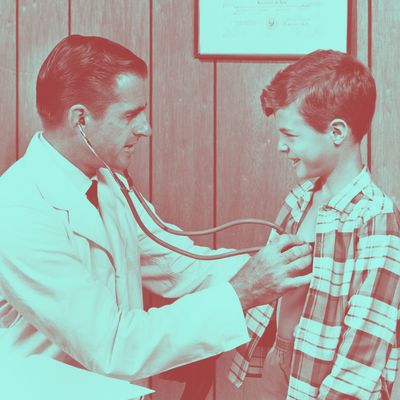
Pain is fascinating. It’s fascinating in part because the intensity and duration of a given feeling of pain depends on a ton of stuff that doesn’t seem like it should matter. As the researchers Elizabeth A. Reynolds Losin, Steven R. Anderson, and Tor D. Wager write in a new paper in The Journal of Pain, “research over the past several decades has shown that pain is highly subjective and modifiable by many factors other than external sources of tissue damage.” You could give the same person the same pinprick in two different settings, and the subjective feeling of the pain they experience might be minor in one and excruciating in the other.
One interesting question that follows from this observation has to do with the relationships between patients and doctors. Doctors, after all, often perform uncomfortable or painful tests and procedures on their patients. And patient-doctor relationships run the gamut from ice-cold to we’ve-been-family-friends-for-decades. How do patients’ feelings about their doctors affect the level of pain they experience during a given session?
To find out, Losin and her colleagues ran a simulated clinic. “Participants were placed in two groups on the basis of their responses to a questionnaire about their personal beliefs and values, and painful thermal stimulation was used as an analog of a painful medical procedure,” they write.
Here’s what they found:
We found that patients reported feeling more similarity and trust toward their clinician when they were paired with clinicians from their own group. In turn, patients’ positive feelings of similarity and trust toward their clinicians — but not clinicians’ feelings toward patients or whether the clinician and patient were from the same group — predicted lower pain ratings. Finally, the most anxious patients exhibited the strongest relationship between their feelings about their clinicians and their pain report. These findings increase our understanding of context-driven pain modulation and suggest that interventions aimed at increasing patients’ feelings of similarity to and trust in health care providers may help reduce the pain experienced during medical care.
The “most anxious patients” part is interesting, but it makes intuitive sense. If you’re nervous, it might be that you’re more responsive to cues pertaining to emotional warmth toward your doctor. If you’ve had shots a million times and aren’t bothered by them, maybe it won’t bug you as much if your doctor seems a bit distracted or standoffish.
As the authors point out, one reason this research might matter in real-world settings is that patients and doctors don’t always come from the same groups; when it comes to many minority groups, for example, there is a shortage of MDs. If these simulation findings generalize to the real world, that could have important clinical ramifications “Further research is needed to evaluate to what degree our findings using modified minimal groups generalize to real-world sociocultural groups such as racial and ethnic groups and to interventions that increase feelings of interpersonal similarity and trust,” they write. In the meantime, though, this is a cool study that highlights just how complicated the concept of pain is.




